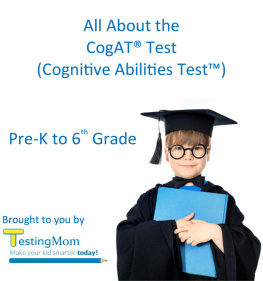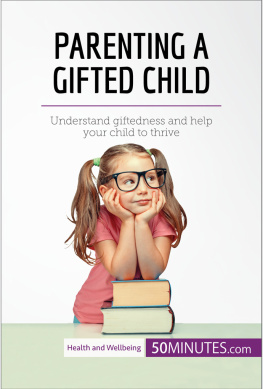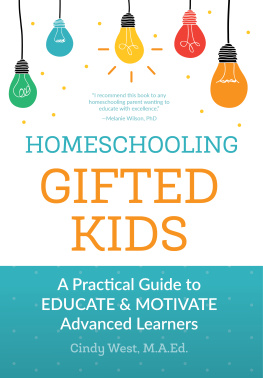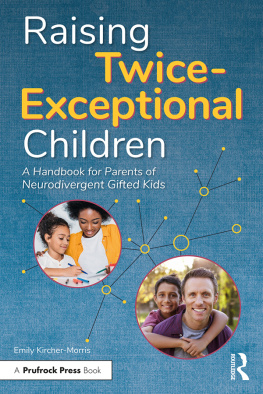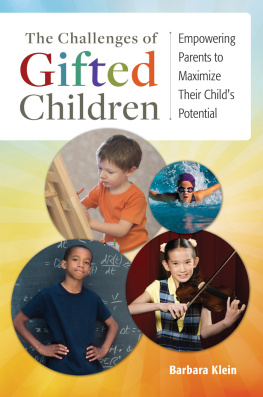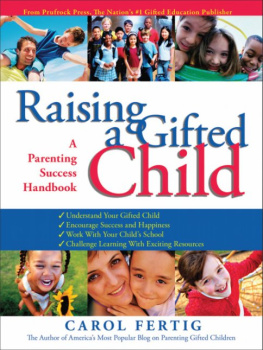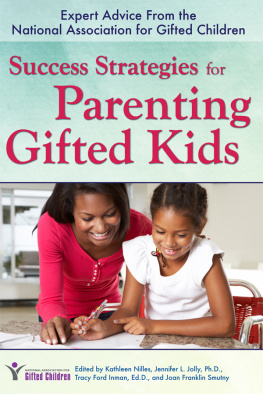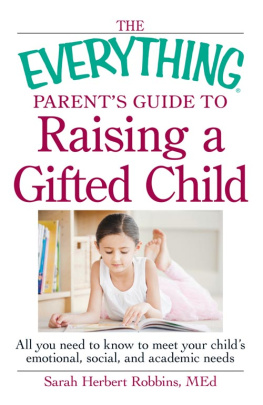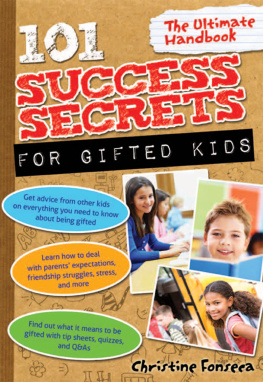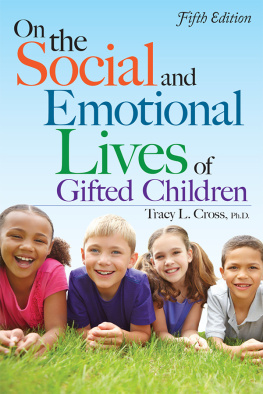
Copyright 2006 by David Palmer, Ph.D.
All rights reserved. No part of this book may be reproduced or transmitted in any form or by any means, electronic or mechanical, including photocopying, recording, or by any information storage or retrieval system without written permission from David Palmer, Ph.D., except for the inclusion of quotations in a review. The PGB logo is a trademark of Parent Guide Books.
Disclaimer: Although care has been taken in the preparation of this book, the publisher and author assume no liability for errors and omissions. Nor is any liability assumed for damages, direct or indirect, resulting from the use of any information contained herein. It is not the intent of the author or publisher to render professional services in this book and the information contained herein should not be used to replace appropriate diagnosis and/or treatment by a qualified medical, educational, or mental health professional.
For more information contact:
Parent Guide Books
PO BOX 8403
Long Beach, Ca. 90808-8403
Or visit: www.parentguidebooks.com
Cover/Interior design: Irene Archer, www.book-cover-design.com
Editing: Judith Myers and Carl Minturn
Proofing: Joann Alsum and Cheryl Gort
Publishers Cataloging-in-Publication (Provided by Quality Books, Inc.)
Palmer, David (David S.)
Parents Guide to IQ Testing and Gifted Education: with a special section on bright kids with learning problems / David Palmer.
p. cm.
Includes bibliographical references and index.
LCCN 2005909269
ISBN 978-0-9771098-5-2
1. Gifted children-Education-United States.
2. Learning disabled children-Education-United States.
3. Parenting-United States. I. Title.
LC3993.9.P35 2006 371.950973
QBI05-600169
Praise for PARENTS GUIDE TO IQ TESTING AND GIFTED EDUCATION

Not just every parent of a gifted child, but every teacher and every guidance counselor of gifted children, too, should read Parents Guide to IQ Testing and Gifted Education. Palmer explains all in one book, what it took me years of talking to dozens of gifted professionals to learn for myself. And Palmer makes it easy to read, with review points at the end of each chapter - if youre in a hurry, read the review points first, and pick the chapters that answer the questions you have right now. But read the whole book cover to cover when you have time - its worth it!
- Carolyn K Mrs. Hoagie, HoagiesGifted.org
A great help to our family. Thanks to Parents Guide to IQ Testing and Gifted Education and a consultation with Dr. Palmer, our bright and talented daughter is now back on track. Based on Dr. Palmers recommendations, we were able to map out a better educational path, identify enrichment programs for her and find ways to connect with other gifted children. A year later, she has regained her love of learning. I highly recommend this book to any parent who suspects their child is gifted and who wants to make sure their child is getting the best education possible.
- Mary Pitzer, Parent
We were curious about our daughters advanced abilities and wanted more information. Dr. Palmers book explained the process of IQ testing and the different aspects of identifying gifted children, as well as explaining gifted education and other educational options. This book helped guide us through the process of identifying our daughters needs and has assisted us in our ability to advocate for her. I highly recommend this book for anyone who is curious about their childs intelligence and wants some direction and help getting answers. It is a reference we refer to often.
- S. Powell, Parent
Parents Guide to IQ Testing and Gifted Education: All You Need to Know to Make the Right Decisions for Your Child by David Palmer Ph.D. is a no-nonsense guide written in plain terms especially for parents concerned about what the best educational recourse is for their gifted child...
- Midwest Book Review
To my family
CONTENTS
PART FOUR: IQ Testing and Intelligence.
Background and Basics
INTRODUCTION
Whats In This Book?
I Q testing and selection for special programs is thought by some to be a mysterious and secretive domain understood only by the chosen few. It shouldnt be. To make meaningful decisions about your childs education you should have as much information as teachers, principals, school psychologists, or anyone else. In this book youll find out how to recognize signs of giftedness and learning disabilities in your own child and learn how IQ tests and other criteria are used to select kids for special school programs. You dont necessarily need to read the chapters in order, or the book from cover to cover, to find what youre looking for. Ill outline whats ahead here so you can skip around a bit to find the exact information you want.
Chapter One: IQ tests can be used to make important decisions about the programs or services your child receives. For instance, IQ scores are often used when determining which students qualify for gifted education programs, or for resource programs designed to help kids with learning problems. Chapter One will help you understand what these tests measure and how to interpret the results so you can better work with those in the schools when making placement decisions for your child.
Chapter Two: Identifying gifted kids who need special support in school can be tricky. In fact, some kids with high IQs are better off in a regular school program. For this reason, IQ scores are usually only one of the criteria used when making placement decisions for gifted programs. Chapter Two reviews some of the other likely criteria and offers suggestions on how to work with the teacher to make sure that your childs learning needs are being met.
Chapter Three: If youre trying to decide whether a gifted education placement is right for your child, youll need to understand what type of program your district is offering and how it differs from what your child is already getting. Chapter Three looks at common types of gifted programs and teaching techniques and offers specific questions for you to consider when thinking about your own childs needs. Alternatives to public school gifted programs are also considered.
Chapter Four: Ive found that some parents are hesitant to ask questions about IQ testing and the gifted program selection process - maybe for fear of appearing pushy or overly concerned. Yet, parents need to have the same information as everyone else when it comes to making educational decisions for their children. In this chapter youll get straight forward answers to the questions parents ask most.
Chapter Five: Your insights into your childs development are important, and the more knowledge you have, the better position youre in to partnership with others when selecting the best programs for your child. Chapter Five looks at some common traits of gifted kids and considers when early identification of giftedness may be needed.
Chapter Six: You dont necessarily have to have a high IQ to do well in life. Other traits like personal motivation, perseverance, and creativity may be just as - or more - important when it comes to happiness and success. In fact, there is little practical advantage, and maybe a real downside, to having an extremely high IQ. This chapter considers the idea of optimal IQ and looks at some of the potential negative aspects of giftedness.
Next page


